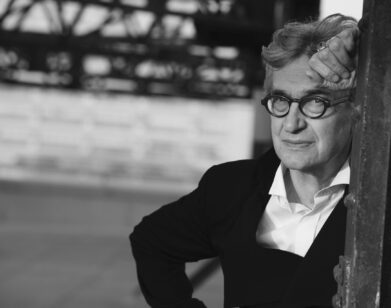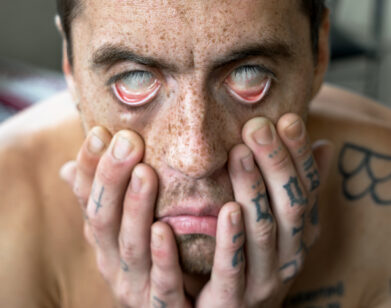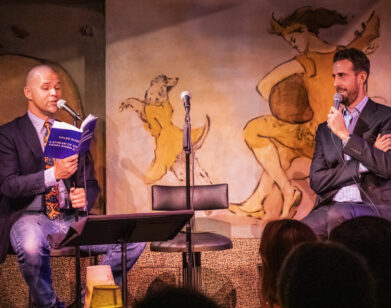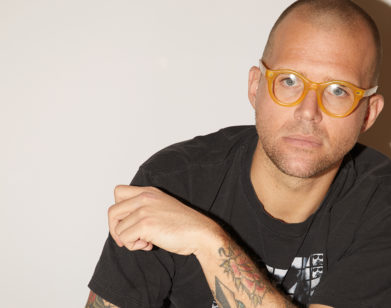ICON
Jim Goldberg on Cucumbers, Cubism, and California Light
I have been following Jim Goldberg’s work since my early 20s, when I discovered his book Raised By Wolves. I don’t think I fully understood it, but I was struck by the reality of the images and how they transported me to a place that was very unlike mine. I was pushing into young adulthood, but my suburban Atlanta upbringing had only shown me so much. We weren’t bombarded with images in the same way we are now, and Goldberg’s book was a proper window into a raw, thought-provoking, and troubled off-the-grid lifestyle. Goldberg uses photographs, conversations, handwritten notes, and drawings to tell stories and give his subjects an active role in the art he creates, which deals with significant and often challenging themes like race, class, age, love, lust, and betrayal. His new book, Coming and Going, has been in the works for over 20 years. It is a sprawling document of his life using ephemera and photographs to illustrate the triumphs, heartbreak, and pain that, on some level, we all experience, but it also shows how meaningful and poetic just living life can be.
On a weekday afternoon, from my apartment in New York City, I spoke to Jim, who dialed in from his studio in Northern California. We discussed his green thumb, competition, teaching, and being a good storyteller.
———
CHRIS BLACK: What’s up, Jim? How are you?
JIM GOLDBERG: A little tired today. I was about to get a cup of coffee and I forgot.
BLACK: Go get it, we’ve got time.
GOLDBERG: It would take about five minutes.
BLACK: If you want a cup of joe, I’ll give you five minutes. It’s my pleasure.
GOLDBERG: Okay, I’m going to run across the street. That’s very generous of you.
BLACK: Of course.
GOLDBERG: [Goldberg returns with coffee]. I’m really smart now.
BLACK: I had one right before too, so I understand. How many coffees do you have a day? Are you a morning or afternoon?
GOLDBERG: Morning, in a big glass.
BLACK: Do you make it yourself?
GOLDBERG: I usually make it at home. I don’t go out for coffee as I live out on a farm in horse country, that is, unless I’m having a day in the studio.
BLACK: Horse country, as in northern California?
GOLDBERG: Yeah. Eight years now.
BLACK: Did you want to get remote?
GOLDBERG: I always thought that I would move out of the city. I grew up in New Haven, and early on wanted to get out of there. First I went to New York, then I moved out west, then traveled to San Francisco because I wanted to be an artist. My partner is also an artist and photographer, Alessandra Sanguinetti, and she has country blood deep inside of her.
BLACK: She was feeling called back to the land and you were happy to oblige.
GOLDBERG: Always. Fortunately, we had some family help and were able to buy a farm. It’s wonderful.
BLACK: Is this a working farm?
GOLDBERG: I work at it, but it doesn’t work. [Laughs] Mostly, it’s growing things for us. There’s an orchard. We have a few donkeys, sheep, two goats, and chickens. I’m trying to see if I have pictures of my last—
BLACK: Crop? [Laughs]
GOLDBERG: Crop of something. Here’s Alessandra and a good cucumber.
BLACK: That is a nice-looking cucumber.
GOLDBERG: Yeah, it’s big. Size matters a little bit.
BLACK: [Laughs] Size matters.
GOLDBERG: I mean, sometimes they’re sweeter if they’re small. I’m sure you know about that.
BLACK: Of course. I’m a cucumber lover. What crop are you most proud of?
GOLDBERG: I remember that taste of cucumbers and tomatoes in the summer when I grew up in Connecticut, so I’m attracted to that only because it’s familial. But I grew some good cabbages this year that we grilled up that were delicious.
BLACK: That draw to the West though, I’ve experienced that as well. I went to New Mexico and it’s just so different from anything I’d ever experienced before.
GOLDBERG: Yes. The first place I moved to was in Washington, way up north in Bellingham. My first weekend there, we went hiking to some hot springs, which was exotic for a New England boy, and I fell in love with it. I think the landscape soothed my spirit.
BLACK: It can have that effect. And the light is a real thing.
GOLDBERG: It is a different light. The photographer Hank Wessel talked about that a lot. The warmth of it is similar to being in the Mediterranean. The tone of the light, the color, the intensity is different than back East.
BLACK: Did the West Coast influence the way you were taking pictures?
GOLDBERG: I’m sure, but I don’t think I was conscious enough at the time to know what my progression was. I was just becoming. And, for the most part, I wasn’t analyzing my actions or thoughts until I went to graduate school.
BLACK: You teach now, right?
GOLDBERG: I did teach for 35 years. I’m an emeritus now.
BLACK: Was that something that you were drawn to or was it a means to an end?
GOLDBERG: Well, it’s both. The income helped, and health insurance. But teaching can be an inspiring force in one’s life because of the conversations with students. I would learn more from the students than they probably learn from me. So, although there was a lot of giving, it was a selfish act. But I felt that it was important for me to be focusing on my own practice. Even at my minimal one day a week, it’s really two, maybe three days of preparation and meetings.
BLACK: Of course.
GOLDBERG: At some point I decided I didn’t want that interruption. I wanted to be in my studio because I had joined Magnum photo agency in 2003. I started doing this project, Open See, about migration and trafficking in Europe, and it took me away from the states. Logistically, [teaching] was getting harder.
BLACK: I know the lore and I know it’s prestigious, but what was the appeal of Magnum for you?
GOLDBERG: The photographers really. It’s like being in a family. It is a business relationship, but it’s more of a collective, and that is what I appreciate most. I’m 70 years old and I’m in a collective. It feels progressive.
BLACK: And there’s camaraderie.
GOLDBERG: Yeah, there’s camaraderie, there’s a lot of hate, and there’s love. It has made me a better photographer. I was competitive enough that I knew that I wanted to get better at what I was doing.
BLACK: I’m friends with a lot of photographers and it does seem competitive.
GOLDBERG: I don’t know if it’s just in photography. It’s also in art and probably in everything. Maybe I manifest it myself. If I’m playing a ping-pong game and losing, I feel pretty shitty.
BLACK: Sure. Life is just one big ping-pong game.
GOLDBERG: And I’m always losing, so it doesn’t make a difference. [Laughs]
BLACK: I think in people’s minds, especially people that aren’t in the arts, it’s not competitive. It’s about being creative and supportive. But those human elements can’t be erased.
GOLDBERG: No. I had a choice when I got out of graduate school to move to New York or stay in San Francisco. And I decided to stay in San Francisco because even though I had been successful already—I mean, my first show was in a museum. It felt like I would be a small fish, and I would feel bad that I wasn’t invited to this or that. When you’re in environments like that, it gets even more intense with competition and self-worth.
BLACK: It definitely does.
GOLDBERG: And shrinks are more expensive there. What do you think of the book?
BLACK: I love the book. I mean, I love all the books.
GOLDBERG: This book is kind of special, I think.
BLACK: I think of you first and foremost as an artist. Your commercial stuff feels clearly from the same line of thought. I was looking through some of the pallet stuff that you shot in Hermes. It’s very hard to get that stuff to be cool, and those elements are so rare now, and this book has all of it in heaps. There’s a lot to engage with. A lot of books are super minimal and the layout is really minimal and there are blank pages. And I understand why that exists, but it’s nice to see something more maximal, in a way. And we went through a phase in popular culture where everything was airbrushed and crisp in a way that feels not real, but a big part of your practice is storytelling with real people. There’s a human touch element that feels like it’s coming from a person versus a camera.
GOLDBERG: Thank you for saying that. You never really know if your work resonates with a stranger. All you can do is make it and hope it conveys a feeling of intimacy, at least in Coming and Going. But at the same time, it’s also universal. A good storyteller will look to themselves and figure out a way to make it relate to you.
BLACK: Of course. There’s also less left to the imagination in a way that I really like, where the impetus is not completely on me to decide what is going on in the image.
GOLDBERG: I tried to sequence it with enough connections that the viewer can comprehend what my story is, but so there are enough breaks in between the pages that it gets the synapses going and the viewer must make up the difference of those small silences.
BLACK: I have my tome right here, and it seems like this is a real behemoth to sequence. Is that a part of the process that you enjoy?
GOLDBERG: Oh, that’s the beauty and struggle of it. The magic of putting unrelated images or objects or stories together to create a different tension, because there is no truth. We always move towards an approximation of the truth.
BLACK: Yes, we do.
GOLDBERG: It’s an uncovering process. I have first readers, and an assistant at my studio. Then I sit with it myself and play with it. You’re trying to mine the work and the mind and see where it takes you. Sequencing is a delight. It’s like drinking a good cup of coffee and getting the rush. There’s a real high.
BLACK: I think about it in parallel to albums in music and how sequencing was so important, and now that we listen to music differently, it doesn’t matter in the same way. I think that’s a loss for us as a society.
GOLDBERG: Yeah, I resent that. Mostly because I am a visual person, so actually having the physical albums made me remember how the story was being told by the artist. I’ve lost that now because I’m on Spotify just jumping between genres, which is fantastic. I was listening to Kanye before you called and before that, Laurel Halo.
BLACK: Yeah. I mean, I just turned 41, so I’m the exact age to have a conscious memory before the internet. And—
GOLDBERG: No, you’re at the exact age where you have to get your shit together.
BLACK: Is that what it is? [Laughs]
GOLDBERG: I have no idea what your shit looks like.
BLACK: [Laughs] My shit looks pretty good.
GOLDBERG: Oh, good.
BLACK: But has technology affected your process much? Or do you try to stay the course and do what you feel comfortable with and what you’d like?
GOLDBERG: There is a hybridization in my work where I combine different methodologies and mediums, so I have to embrace the technology to an extent. But I do have a lot of help with the technological parts.
BLACK: You’ve seen a lot of trends come and go in photography, and I’m sure some of those stick and some of them don’t.
GOLDBERG: Yeah. Hopefully, you do what you do best, and you hope that some people are into it.
BLACK: That’s all you can do. The way that you embed yourself with the subjects for significant amounts of time, is that something that comes naturally to you?
GOLDBERG: Yeah, it comes naturally to me. With people that know me, I always ask personal questions about love or life or work, and I’m the same way when I do my work. It might be in reference to the subject that I’m photographing. It might be about being a refugee. I get right to the heart of it. I don’t fuck around.
BLACK: That is something that’s in such short supply these days. We live in a world of pleasantries and small talk. Asking the big questions shocks people in a way that they feel compelled to be honest.
GOLDBERG: Yeah, it’s disarming in a way. Also, some historical background is that when I first went to university, I was a theology major. So I think the theological questions that I was attracted to are similar to what I feel attracted to in the art making process. It’s all about trying to understand things that are impossible to understand.
BLACK: Some of the answers that you get are so profound and almost so simple.
GOLDBERG: I always thought that I was making a book and I was in the story. I didn’t realize that the story was about me until towards the end.
BLACK: Really?
GOLDBERG: When I was doing Raised by Wolves, some street kids said, it’s really hard to see things that are right in front of my face. And I felt that way about this book. It was really hard for me to see that it was obviously about my life, but I think I figured out a strategy to open it up so that it was relatable to the audience. Claude Lévi-Strauss—I’m not going to get theoretical or anything, but he would always talk about how we’re attracted to other cultures but there’s a feeling of negativity in looking at one’s own culture and one’s own self. I had to bring the same criticality I brought to my work when I’m photographing outside of my life to my own life also, so that I wasn’t just that photographic witness, but also the real, true participant. By doing that, the boundaries get blurry. Memories change. Being able to study all the pictures of my father is bringing him back to me, even though he’s gone. There’s real magic in what photography can do for us sometimes, and how it holds onto time.
BLACK: You’re right. There’s a nice relatability that isn’t exclusionary, which I think a lot of people suffer from.
GOLDBERG: Yeah. I read a review where some online trade magazine said, Jim Goldberg is not one of those artists who takes his family photographs and makes you go through them with him and you can’t relate at all. He figured out a way of doing it so that his personal pictures became our pictures. I liked how they said that.
BLACK: Yeah, that feels good. Are you in the studio? I’m impressed with the collection behind you.
GOLDBERG: Yeah, all my books.
BLACK: Are you a big collector?
GOLDBERG: I’m a big collector in general. If you look at the book, you’ll see. I have hair, I have toothbrushes, I have letters to Santa, things that my mother sent me. I mean, I have boxes and boxes of stuff, and the same with books. I’ve slowed down because in the past five years I was making this book and I didn’t need to look at other books, I needed to look at mine.
BLACK: That’s interesting, because musicians also do something where they don’t listen to anything else because they need to be in the zone.
GOLDBERG: I was always looking, but not intentionally. So if I went to a place and I felt something, I would absorb or steal the idea.
BLACK: The only way to do it, really.
GOLDBERG: Part of the magic of being an artist is that you can borrow from all kinds of references and combine them. Especially with how I’ve taken a montage of my life and collaged it at times, it feels right to look at things from multiple levels. I probably, at the time, would’ve been a cubist.
BLACK: I’m glad you know that about yourself.
GOLDBERG: They seem to have had a lot of fun.












